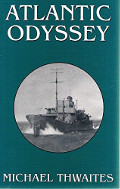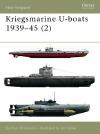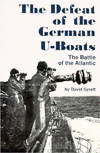Atlantic Odyssey
Thwaites, Michael
1999, New Cherwell Press, Oxford
ISBN 1900312352
215 pages, 1 map, 19 photographs
| Type. | Personal account of service |
| Pros. | Balance of sea service and domestic life: very well written |
| Cons. | Dubious poetry too prominent, and it is too short - more of everything would be great! |
| Rating. |  |
 This is the interesting and unique story of an Australian RNVR lieutenant in ASW trawlers in Western Approaches Command, 1940-43. He had been a brilliant Rhodes scholar at Oxford, and went on after trawler service to command Guillemot, one of Monsarrat’s previous postings.
It is a much fuller, and better, account than many first-hand, Atlantic Campaign experiences. Thwaites has been published before, but in poetry, not autobiography, nor accounts of naval action. It is a brilliant balance: colourful, informal, breezy, but with great detail, access and display of information. It is thoughtful about each new occurrence and place come upon, less than romantic about the size of the ships, the weather, their chances if anything goes wrong. It is class-conscious but not class-bound, mixing the author’s religious views about war and marriage with dubious poetry about acts of gallantry and fame, and service life without any striking of harsh or wrong chords. The poetry may be dubious, but it doesn't jar with its surroundings. He was a poet, and that was how he reacted to his experiences, the loss of Jervis Bay, the death of his infant son. It is well illustrated with unusual, unofficial photos - marriage, the ships, a series of tiny ocean going trawlers and their half-civilian crews, their merchant charges, the places they voyaged to - NY, Bermuda, Puerto Rico, Brazil, W. Africa, and lastly wife and son, home again in their first house together.
This is the interesting and unique story of an Australian RNVR lieutenant in ASW trawlers in Western Approaches Command, 1940-43. He had been a brilliant Rhodes scholar at Oxford, and went on after trawler service to command Guillemot, one of Monsarrat’s previous postings.
It is a much fuller, and better, account than many first-hand, Atlantic Campaign experiences. Thwaites has been published before, but in poetry, not autobiography, nor accounts of naval action. It is a brilliant balance: colourful, informal, breezy, but with great detail, access and display of information. It is thoughtful about each new occurrence and place come upon, less than romantic about the size of the ships, the weather, their chances if anything goes wrong. It is class-conscious but not class-bound, mixing the author’s religious views about war and marriage with dubious poetry about acts of gallantry and fame, and service life without any striking of harsh or wrong chords. The poetry may be dubious, but it doesn't jar with its surroundings. He was a poet, and that was how he reacted to his experiences, the loss of Jervis Bay, the death of his infant son. It is well illustrated with unusual, unofficial photos - marriage, the ships, a series of tiny ocean going trawlers and their half-civilian crews, their merchant charges, the places they voyaged to - NY, Bermuda, Puerto Rico, Brazil, W. Africa, and lastly wife and son, home again in their first house together.
Thwaites underwent a true odyssey, two and a half years and an ocean away, to the Arctic, Iceland, Halifax and ‘Newfyjohn’, easy life ashore and escorting the first US Coastal convoys from New York in the aftermath of Drumbeat, taking a floating dock to the Caribbean, moving onward from one command to the next, Trinidad and Brazil, delayed by an operation or two in each area, finally crossing the South Atlantic to work out of Sierra Leone before return to the UK in 1943, after the Atlantic climax.
Despite his distance from the war and the deadly campaign raging north and around him, there is never a sense of boredom, nor of feeling that the war is someone else’s. The war may be passing them by, but they are aware of it, never far away, and that they are involved, vitally, in their corner, contributing like anyone and everyone else. At times they are threatened by the weather, for they did endure the worst gales of the war; at others by heat and limited fuel, they do get to rescue men from ships sunk in mid-Atlantic, and see the war close-up. They are also at times comically separated, as in the easy, welcome life ashore in NY where they never had to pay for taxis or lifts, are invited to a multitude of unrationed meals in American homes, and rarely pay for theatre tickets or drinks. They are also tuned to the wrong listening frequency in one escort voyage, and never hear the U-Boats talking incessantly to home, all around them. He can describe the tedium and stress without engendering them in us.
In this work Thwaites also went through a long separation, even for wartime marriages, and a great distance from his wife, a miscarriage, and a successful pregnancy and birth. He was never within three thousand miles for any of these, save conception. We are aware through their letters and her postwar recollections, decades after, of the struggles of separation, of service marriages, of the difficulties of communication. Though, when based in NY and Bermuda they could usually manage a telegram or even a phone call, more like today than not, when people send phonecards and even prepaid mobiles to their loved ones in the service. We also see his wife’s adjustment into a service marriage, on a service wage, confronting the difficulties of housekeeping amid rationing and shortages without the maid she was accustomed to, hiring a piano, and going out to work for the government as well. She bore their long stretches apart, brief messages and letters arriving in clumps, the tragic illness and death of their firstborn, and another pregnancy and birth, all without him too. They do have rough moments, apart and together, but it is their love, and their faith in god and each other, which sustains them, something else which might seem quite alien to many today.
It is a pity there is not more of home life before the war, training, and service life after the period of this book, to balance these events. A fuller story of the entire war, including the last two years, when Thwaites rose to command the frigate Guillemot, would have made this a five-star account. More insight could be shown into Britain and how it was changed by war the way Thwaites and his family and friends were. That is not his subject, of course, Thwaites wants to recapture the sense of change from peace to war, from scholar to RNVR lieutenant, from poet to warrior and officer, how the war came to him and what it enabled him to do. The changes were subtle, and the predicaments and problems sometimes seem minor, though we can be sure they were not. Thwaites appears to adjust perhaps a little too well, though we cannot see a lot of his inner conflict. His faith, and the general acceptance of the war being a larger task and a great thing to be overcome by all those around him, are one thing that enabled him to keep going, amid the tension and the uncertainty of whether they would survive, and where they might be posted next, further from home and family.
The reviewer welcomes your comments on this review.
Review written by Ian Campbell, Launceston, Tasmania.
Published on 6 Sep 2003.
Purchase information: (info) Get Atlantic Odyssey now at amazon.co.uk
Get Atlantic Odyssey now at amazon.co.uk
Return to our main review page.



